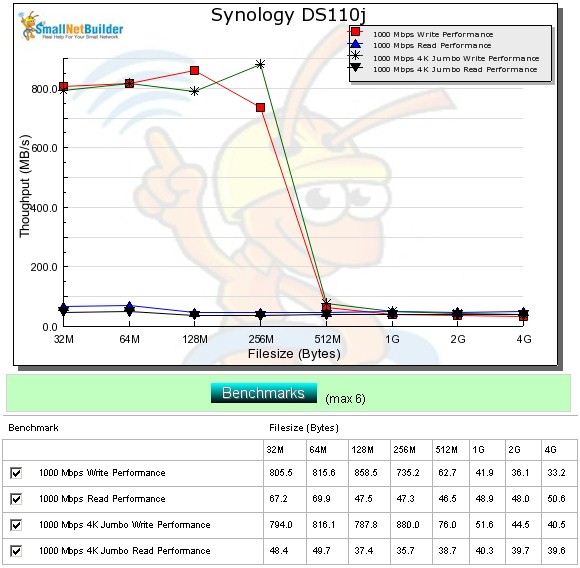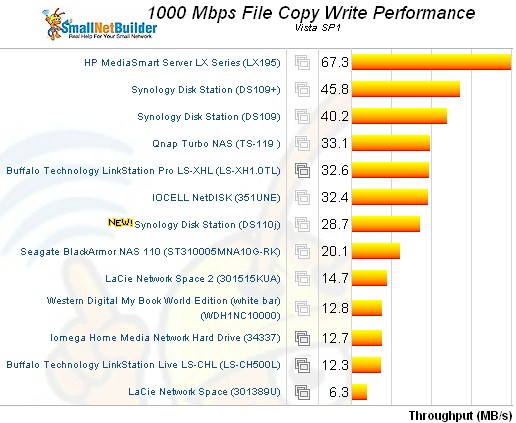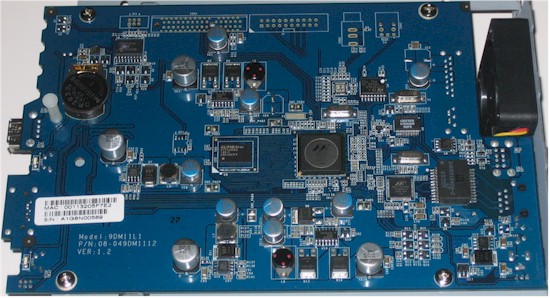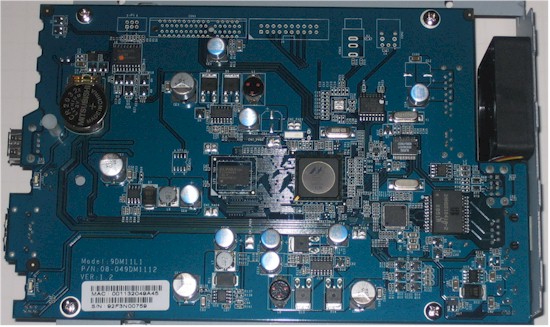The Synology DS110j has been added to the NAS Charts.
The 110j has caused quite a stir as Synology’s least expensive NAS at only $150. The hardware platform is based around a Marvell 88F6281 Kirkwood SoC clocked at 800 MHz with 128 MB of RAM.
Other components include 4 MB of flash, Genesys Logic GL850G USB Hub 2.0 controller, Marvell 88E116R Gigabit Ethernet controller and Microchip PIC16F627 CMOS FLASH-based 8-bit microcontroller.
Figure 1: Synology DS110j board
A look at the board photo in Figure 1 reveals that it’s the same as the Synology DS109‘s in Figure 2, right down to the raw board number. The only differences between the two are the 800 MHz vs. 1.2 GHz Kirkwood and missing eSATA port.
Figure 2: Synology DS109 board
Since the eSATA port comes from the Marvell SoC, if you’re willing to void your warranty and are handy with a soldering iron, you could probably slap an eSATA connector on, pop out the front panel plug and be good to go.
The 110j came with a Seagate ST31000528AS Barracuda 7200.12 1 TB drive installed, which yielded a total power consumption of 13W with the drive spinning and 6W with it spun down via the programmable power save feature. The single fan was nice and quiet, so I rated the 110j’s noise level as very low.
The 110j supports Synology’s the entire DSM 2.3 OS feature set, except for RAID related functions, of course. Backup options include USB, rsync targets and Amazon S3 and there are plenty of media serving options including iPhone/Mobile access, Photo web server and UPnP / DLNA support.
Tests were run with DSM 2.3-1141 firmware using our standard test process. Write performance using iozone with a Gigabit LAN connection showed very high write caching speeds. For file sizes 1 GB and up, writes floated down to 33 MB/s from 42. Read speeds were steady in the high 40 MB/s range.

Figure 3: DS110j throughput vs. file size
Average write performance using a Gigabit Ethernet connection measured 43.5 MB/s for file sizes between 32 MB and 4 GB, with cached behavior not included in the average calculation. Average read performance was significantly higher, measuring 53.2 MB/s. This ranks the 110j below both its DS109 and DS109+ siblings for write and slightly above the DS109 for read.
Write file copy performance using our Vista SP1-based test showed the price paid for using the slower Kirkwood SoC. Figure 4 shows the 110j providing just shy of 29 MB/s while the slightly more expensive DS109 powered along at 40 MB/s. Read file copy rankings were the same. But the 110j did better at 50 MB/s vs. the DS109’s 67. Still, these results are not too shabby for a $150 (without drive) NAS!

Figure 4: DS110j file copy performance – write
Synology supports read and write to FAT, NTFS and EXT3 formats for USB external drives. But, unlike QNAP, Synology still suffers a hefty performance hit with NTFS. Backup speeds measured 18.6, 22.8 and 6.4 MB/s for FAT, EXT3 and NTFS, respectively.
Also checked was network backup to a QNAP TS-239 Pro II rsync target, which cruised along at a respectable 15 MB/s. Finally, I also tested write and read speed to a 10 GB iSCSI target and measured 31.4 MB/s and 33.9 MB/s for write and read.
Since Synology’s feature set has been amply covered in other reviews, there won’t be a full review. So use the NAS Charts to further explore the DS110j’s performance and compare it to other products.


